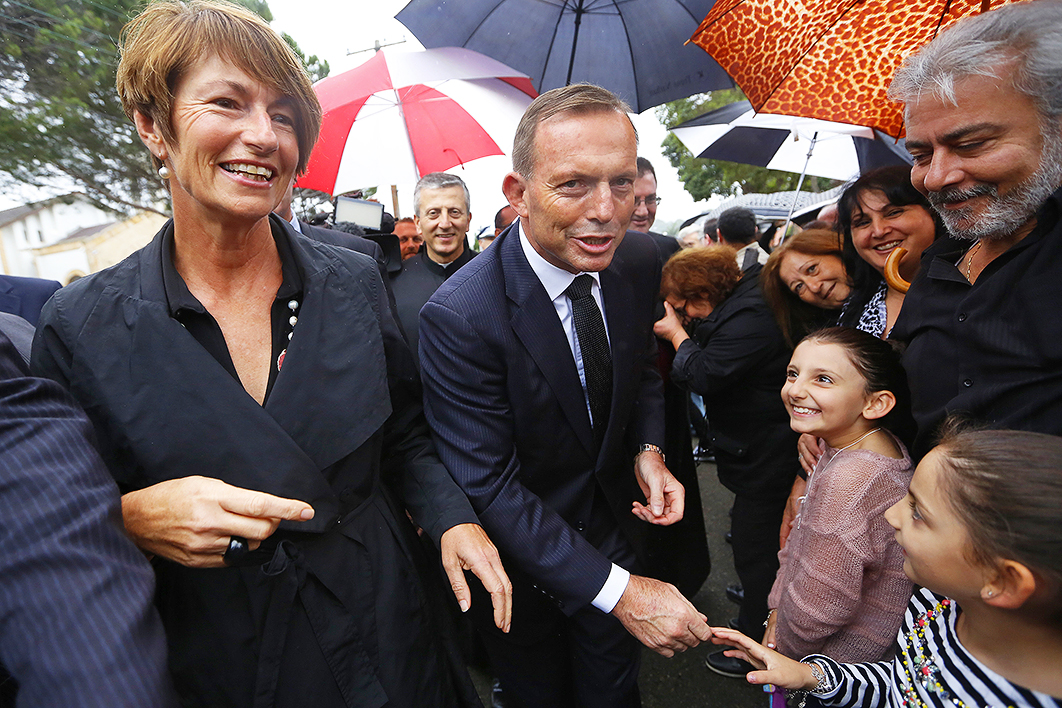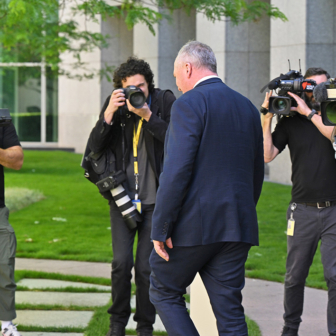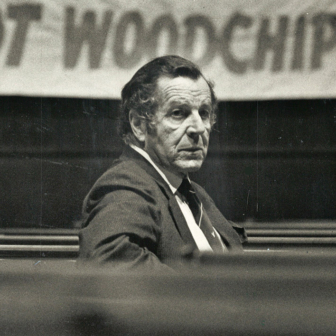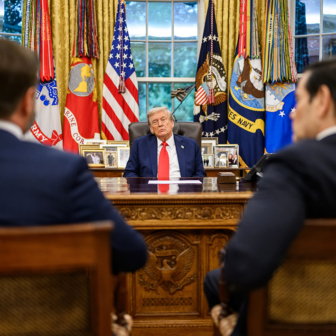Not long before he died in 1998, that veteran conservative political warrior B.A. (Bob) Santamaria granted me a series of interviews. After one session, over a cup of tea, his spirits seemed low and he wondered aloud if he had achieved much. The world seemed as troubled a place as ever.
In an effort to cheer him up, I suggested that, given he’d been on the receiving end of a great deal of anti-Catholic sentiment over the years, he might be heartened by the fact that religious bigotry was no longer evident in public life.
Santamaria looked at me with sad eyes, shook his head and said quietly, “No, bigotry has not gone. It is religious belief that has faded, but once that returns, if it does, back will come the old hatreds.”
Santamaria was blamed by many people for splitting the Labor Party in the 1950s. His largely Catholic-based industrial groups, set up to fight communist influence in the unions, expanded into a force that almost took control of the Labor Party. Now, he was conceding that religion and politics, often inextricably bound together, constituted “an ugly mix.”
Two decades later, one of his acolytes, Tony Abbott (about whom Santamaria had reservations), is busy playing the religious card as he seeks to undermine Malcolm Turnbull and his government and avenge his thoroughly deserved toppling from the prime ministership.
Earlier this month, he spoke to a Liberal Party branch meeting in assistant treasurer Michael Sukkar’s electorate of Deakin, in Melbourne. The event was billed as “a rare opportunity to join former prime minister Tony Abbott to discuss how to navigate the political sphere as a Christian.”
According to media reports quoting a member of Abbott’s audience, the 200-strong gathering was “basically in raptures” at the end of Abbott’s presentation. “He is definitely on the warpath,” the source said. “I have never seen him speaking so well or looking so good.”
A leaked recording of the address, in which Abbott criticised the direction of both the government and this year’s federal budget, reveals the crude populism of the drum he is beating. The former PM implores members to heed the “two fundamental precepts” of Western civilisation, “both of which stem originally from the Gospel” — equality in the eyes of God (“equal rights, equal dignity, equal responsibilities”) and treating others as you would have them treat you.
Never mind the former PM’s own patchy record on equality (for women and asylum seekers, for example), the “Western civilization” that he invokes is a curious one that omits such defining features as the Reformation, the Enlightenment and religious tolerance. (“For too long,” he said, “the good people of our country have been too tolerant of people who do not share some of the fundamental values that have made us who we are.”)
Quite apart from its highly idiosyncratic reading of history, the speech raises many issues. How did such concerns come to the fore in the Liberal Party? Who is the presumed wider audience for such messages? Why is he doing this?
Tony Abbott’s comments that night are a reminder of how much, and in how relatively short a time, Catholicism has come to characterise the Liberal Party. For much of its history, the party and its non-Labor predecessors were bastions of Protestantism; it was in the Labor Party, traditionally, that Catholics found their political home. As the political historian Judith Brett has noted, “Australian Liberals’ central values and stories drew on Protestant values and stories… Their virtues were Protestant virtues, and [in their minds] there was an easy slippage between the vices of the Labor Party and the vices of Protestantism’s historic enemy, the Roman Catholic Church.”
This sectarian strand in non-Labor politics goes back a long way. Australia’s first prime minister, Edmund Barton, ran into a sectarian storm when he visited Pope Leo XIII in Rome on his way back from receiving a knighthood in London. When the Pope presented Barton with a gold commemorative medallion, the ire of Australian Protestants was raised. The fiery anti-Catholic cleric Reverend William Dill Macky organised a petition of protest that attracted more than 30,000 signatures.
(Barton and the pontiff conversed in Latin during the visit. Some years ago, through an intermediary, I sought to obtain a record of their meeting from the Vatican archives, but I was informed it was “not accessible.” This might suggest, even a century later, that the Vatican, aware of the controversy in Australia, was unwilling to fan sectarian embers.)
A decade and a half later, Labor was split by the bitter debate over whether men should be conscripted to fight in the first world war. When Catholics opposed this form of assistance to Britain, supporters of conscription accused them of disloyalty, despite the fact that British troops were being used to repress the independence movement in Catholic Ireland.
When the modern Liberal Party swept to power under Robert Menzies in 1949, John Cramer was the lone Catholic in the overwhelmingly Protestant party, and he felt it keenly. Menzies — in many ways the least sectarian of people — had a habit of joking whenever Cramer walked into a room, “Be careful, boys. Here comes the Papist.” It was rare, even as recently as forty years ago, to find Catholics in the Liberal ranks; the party was profoundly Protestant and more than a little suspicious of Catholics and their supposed clannishness.
Menzies was aware of these perceptions and would make light of them. In 1961, after long-serving Arbitration Commission president Richard Kirby received a knighthood, Menzies quipped that he had only recently learned that Kirby was a Protestant. “If I’d known that, Dick, you would have got your knighthood a lot earlier,” he added. “I thought you were a left-footer.”
If there was a turning point, then it was the moment in 1988 when Nick Greiner (now federal president of the Liberal Party) became premier of New South Wales. This was the first time since a single case in the 1930s that a Catholic had led a non-Labor government. What is extraordinary, given Australia’s sectarian history, is that it aroused so little interest at the time. (In fact, the next four leaders of the Liberals in NSW were also Catholics.) Something had changed, quickly and profoundly.
The sectarian politics of the 1950s, when the Labor Party split over communism and much of its Catholic conservative wing left to form the Democratic Labor Party, were ugly and bitter. No one knew this better than Bob Santamaria.
The Labor Party, once regarded as a natural home for the Irish-Catholic working class, grew increasingly suspicious of the Catholics who remained in its ranks. Meanwhile, elements of the Liberal Party fought hard against visionaries like John Carrick, the NSW general secretary of the Liberal Party, who sought to court the Catholic vote, chiefly by taking up the proposal that government funds — referred to at the time as “state aid” — be provided to non-government, especially Catholic, schools.
It’s hard to exaggerate the significance of the Liberals’ eventual support for state aid. It broke down barriers and opened up a major political realignment by prising the Catholic vote away from Labor. Carrick told me many years ago that Menzies entrusted the negotiations to him, knowing full well the opposition within Liberal ranks to such an initiative. “Such things are beyond the comprehension of a simple Presbyterian,” Menzies told Carrick.
The Menzies government was already the beneficiary of a “soft” Catholic vote through the preferences that had flowed from the breakaway Democratic Labor Party, which enabled Menzies to scrape in by a single seat in 1961. Sitting on such a meagre majority, Menzies was keen to go further — to build on that indirect support by actively courting Catholic voters.
State aid, bitterly opposed by Labor following the split, was the key. It was to prove one of the decisive contributors, along with economic recovery, to the increase in Menzies’s majority in 1963. (Interestingly, when the Liberals gained power at the 1965 NSW election after twenty-four years of Labor rule in that state, Labor’s most pronounced electoral decline was in heavily Catholic areas, whether working-class or not.)
It was a high-risk strategy for Menzies and an uneasy Liberal Party. Some MPs even saw a split looming, such was the intensity of feelings aroused. Protestants at large, mostly Coalition voters, opposed state aid by a margin of three to two, according to opinion polls. But there was an even greater degree of opposition evident among Protestant clergy, lay organisations and associations of state school teachers. One prominent NSW Liberal supporter of state aid, Ben Doig, lost his preselection in a bitter contest over the issue.
Behind the generic argument that Catholic parents were entirely free to avoid the double financial burden by sending their children to state schools lurked two other issues: very few Protestant schools existed, and they were mostly attended by the children of wealthy parents; and within the opposition to state aid was a measure of plain anti-Catholic prejudice. That bigotry was common. Writing in 1963, journalist Peter Coleman, later a NSW Liberal leader, described a “traditional prejudice against Catholics” and recounted how an interview he conducted with a Liberal leader who favoured state aid led to “a stream of abusive letters” to them both.
Yet, within the space of a single generation, all that changed. In 2009, a Catholic leader of the Liberal Party (Turnbull) was challenged by another Catholic (Abbott) in a three-way ballot with yet another Catholic (Joe Hockey). Such a scenario would have been unthinkable even as recently as the 1980s; it has been not just a religious and political change, but also a cultural transformation of some considerable magnitude. In the 1970s, Catholic Liberals such as Kevin Cairns and Philip Lynch were rare birds indeed, with Lynch once joking about being a “token tyke.”
At the same time, the lessening of Catholic influence in the Labor Party has seen its focus veer towards more post-materialist concerns, notably in women’s rights, gay rights, marriage equality and the environment — what conservatives rail against as a “progressive agenda.”
New areas of political contestation (the “moral” Liberals versus the “godless” Labor Party, for instance) have opened up. The culture wars, which have dominated political discourse over the past twenty-five years, say more about conflicting sets of abstract values than about concrete policies in areas as diverse as education and immigration. Political discourse has been, to a large extent, “valuised,” with all sorts of implications for political messaging and campaigning.
Does Tony Abbott have a wider audience for a Gospel-flavoured conservatism? One might suspect not, given the declining importance of religion in Australia. In the 2016 census, the number of people reporting no religion increased noticeably from 19 per cent (in 2006) to 30 per cent. The largest change was between 2011 and 2016, when an additional 2.2 million people reported having no religion. According to a global Gallup poll in 2008, 70 per cent of Australian adults consider religion to be of no importance in their lives.
International surveys have identified Australia as one of the least religious nations in the developed world, particularly among Australia’s youth, who were ranked as the least religious worldwide in a 2008 survey reported by the Christian Science Monitor. While only 7 per cent of youths internationally didn’t regard life as having a spiritual dimension, that figure was 28 per cent among young Australians. This is scarcely fertile ground on which to build a wider base of support.
When Tony Abbott talks of “the conservative base” with which he identifies, presumably he means that minority in the Liberal Party who call themselves conservatives. People join political parties for a multitude of reasons, and there is no reason to assume that party members are in any way representative of society as a whole. With membership of all political parties not much more than 1 per cent of the population, and the Liberal share a small proportion of that, his presumed base is tiny indeed.
In his speech to the Deakin electorate branch, the former PM said the Liberal Party needed help “so that we can be what we really are,” a remark as enigmatic as it is disturbing. It carries suggestions of a lone crusade, perhaps again demonstrating the flawed judgements that characterised, and eventually ended, his tenure in the job. One suspects Mr Santamaria would not be amused. •




